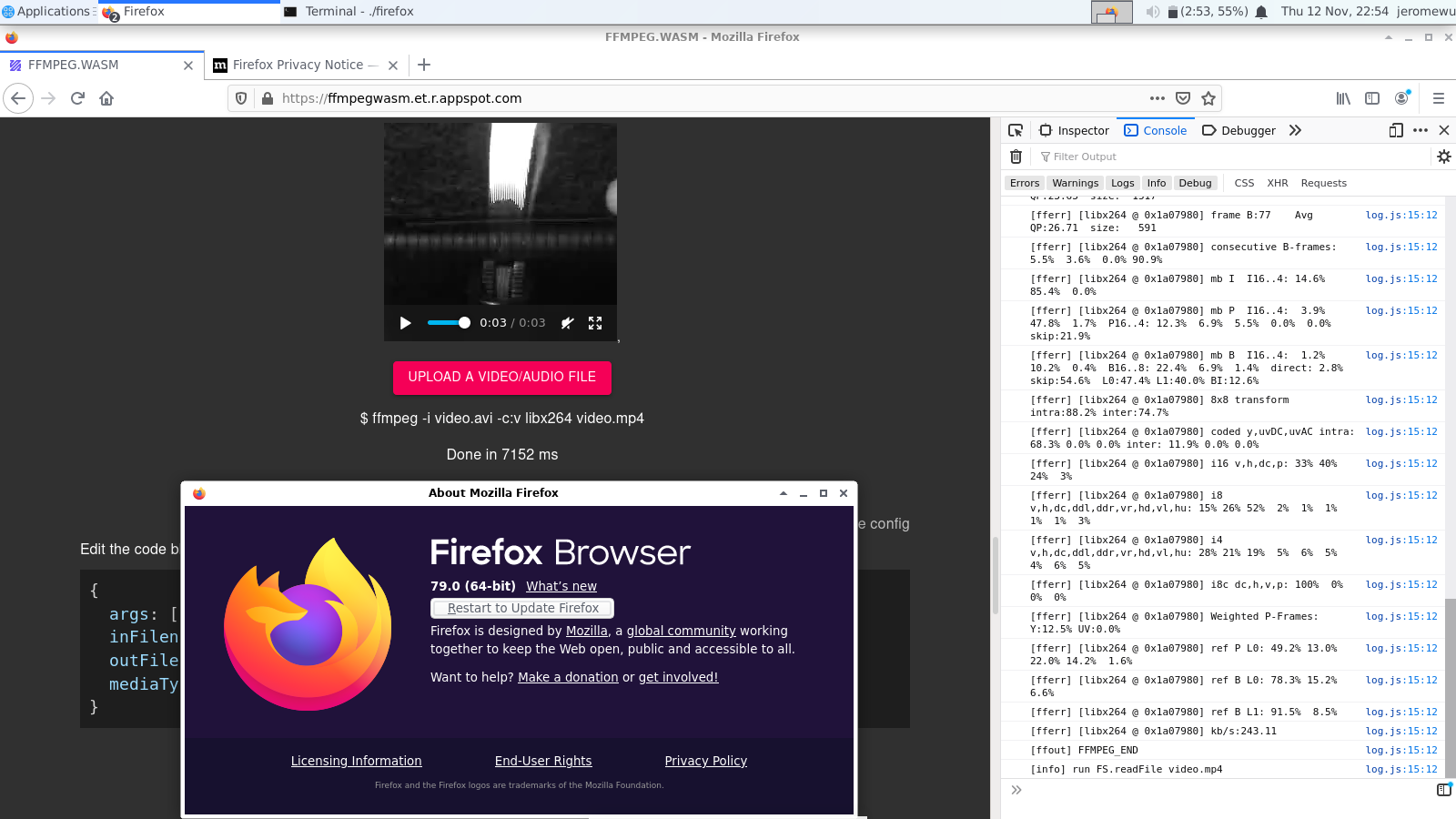ffmpeg.wasm is a pure Webassembly / Javascript port of FFmpeg. It enables video & audio record, convert and stream right inside browsers.
AVI to MP4 Demo
Try it: https://ffmpegwasm.netlify.app
Node
$ npm install @ffmpeg/ffmpeg @ffmpeg/core
As we are using the latest experimental features, you need to add few flags to run in Node.js
$ node --experimental-wasm-threads --experimental-wasm-bulk-memory transcode.js
Browser
Or, using a script tag in the browser (only works in some browsers, see list below):
SharedArrayBuffer is only available to pages that are cross-origin isolated. So you need to host your own server with
Cross-Origin-Embedder-Policy: require-corpandCross-Origin-Opener-Policy: same-originheaders to use ffmpeg.wasm.
<script src="static/js/ffmpeg.min.js"></script>
<script>
const { createFFmpeg } = FFmpeg;
...
</script>Only browsers with SharedArrayBuffer support can use ffmpeg.wasm, you can check HERE for the complete list.
ffmpeg.wasm provides simple to use APIs, to transcode a video you only need few lines of code:
const fs = require('fs');
const { createFFmpeg, fetchFile } = require('@ffmpeg/ffmpeg');
const ffmpeg = createFFmpeg({ log: true });
(async () => {
await ffmpeg.load();
ffmpeg.FS('writeFile', 'test.avi', await fetchFile('./test.avi'));
await ffmpeg.run('-i', 'test.avi', 'test.mp4');
await fs.promises.writeFile('./test.mp4', ffmpeg.FS('readFile', 'test.mp4'));
process.exit(0);
})();For each version of ffmpeg.wasm, there is a default version of @ffmpeg/core (you can find it in devDependencies section of package.json), but sometimes you may need to use newer version of @ffmpeg/core to use the latest/experimental features.
Node
Just install the specific version you need:
$ npm install @ffmpeg/core@latestOr use your own version with customized path
const ffmpeg = createFFmpeg({
corePath: '../../../src/ffmpeg-core.js',
});Browser
const ffmpeg = createFFmpeg({
corePath: 'static/js/ffmpeg-core.js',
});For the list available versions and their changelog, please check: https://github.com/ffmpegwasm/ffmpeg.wasm-core/releases
Multi-threading need to be configured per external libraries, only following libraries supports it now:
Run it multi-threading mode by default, no need to pass any arguments.
Need to pass -row-mt 1, but can only use one thread to help, can speed up around 30%
There are two components inside ffmpeg.wasm:
- @ffmpeg/ffmpeg (https://github.com/ffmpegwasm/ffmpeg.wasm)
- @ffmpeg/core (https://github.com/ffmpegwasm/ffmpeg.wasm-core)
@ffmpeg/core contains WebAssembly code which is transpiled from original FFmpeg C code with minor modifications, but overall it still following the same licenses as FFmpeg and its external libraries (as each external libraries might have its own license).
@ffmpeg/ffmpeg contains kind of a wrapper to handle the complexity of loading core and calling low-level APIs. It is a small code base and under MIT license.
Yes, but only for Firefox 79+ with proper header in both client and server, visit https://ffmpegwasm.netlify.app to try whether your Firefox works.
For more details: ffmpegwasm#106
2 GB, which is a hard limit in WebAssembly. Might become 4 GB in the future.
In fact, it is ffmpeg.wasm-core most people would like to build.
To build on your own, you can check build.sh inside https://github.com/ffmpegwasm/ffmpeg.wasm-core repository.
Also you can check this series of posts to learn more fundamental concepts:
- https://jeromewu.github.io/build-ffmpeg-webassembly-version-part-1-preparation/
- https://jeromewu.github.io/build-ffmpeg-webassembly-version-part-2-compile-with-emscripten/
- https://jeromewu.github.io/build-ffmpeg-webassembly-version-part-3-v0.1/
- https://jeromewu.github.io/build-ffmpeg-webassembly-version-part-4-v0.2/
When calling ffmpeg.load(), by default it looks for http://localhost:3000/node_modules/@ffmpeg/core/dist/ to download essential files (ffmpeg-core.js, ffmpeg-core.wasm, ffmpeg-core.worker.js). It is necessary to make sure you have those files served there.
If you have those files serving in other location, you can rewrite the default behavior when calling createFFmpeg():
const { createFFmpeg } = FFmpeg;
const ffmpeg = createFFmpeg({
corePath: "http://localhost:3000/public/ffmpeg-core.js",
// Use public address if you don't want to host your own.
// corePath: 'https://unpkg.com/@ffmpeg/core@0.10.0/dist/ffmpeg-core.js'
log: true,
});






